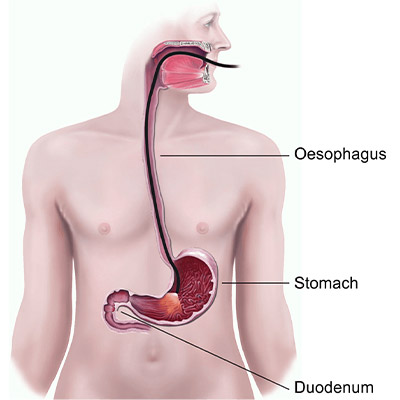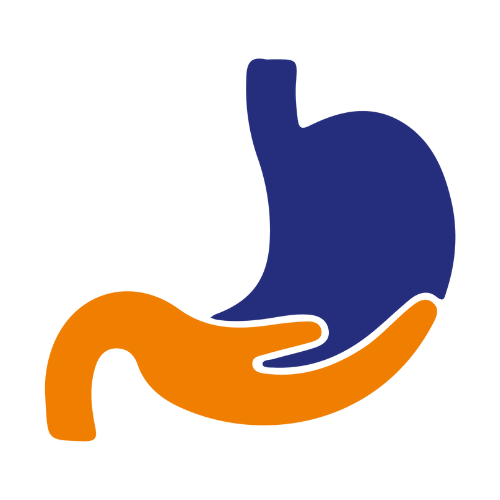
Upper GI Endoscopy
What is an Upper GI Endoscopy?
It is a procedure in which the doctor uses a long thin flexible tube, known as endoscope, to detect any abnormalities in the upper gastrointestinal tract. The endoscope has a camera attached at tip which projects the video images on the monitor. Certain tools may be inserted into the endoscope to collect tissue samples, remove food that may be stuck, inject air or fluid or to stop bleeding.
The upper GI tract include Oesophagus, stomach & the topmost part of the small intestine also known as duodenum.

Why is an Upper GI Endoscopy
required?
Upper GI endoscopy may be performed to identify the cause of certain symptoms.
- Unexplained weight loss
- Pain in the upper abdomen
- Pain or difficulty swallowing
- Persistent Vomiting
- Persistent Heartburn
- Bleeding in the upper gastrointestinal tract
An Upper GI endoscopy can detect digestive problems such as:
- Gastroesophageal Reflux Disease (GERD)
- Inflammation & Ulcers
- Tumours
- Hiatal Hernia
- Coeliac Disease
- Crohn’s Disease
- Infections
Upper GI endoscopy may also be used to:
- Treat bleeding from ulcers,oesophageal varies
- Open up blockages
- Remove polyps
- Place drainage tubes
The doctor may suggest you to temporarily stop your medications before performing Upper GI endoscopy, including medications such as:
- Medications for Diabetes
- Medications for Arthritis
- Medications for Blood Pressure
- Blood Thinners
- Nonsteroidal Anti-inflammatory Drugs
How one should prepare?
What to Expect During & After the Procedure
What Happens After Procedure?
After an upper GI endoscopy, you can expect the following:
- To stay at the hospital or outpatient centre for 1 to 2 hours after the procedure so the sedative can wear off
- To rest at home for the rest of the day
bloating or nausea for a short time after the procedure - A sore throat for 1 to 2 days
to go back to your normal diet once your swallowing returns to normal
After the procedure, you—or a friend or family member who is with you if you’re still groggy—will receive instructions on how to care for yourself when you are home.
Some results from an upper GI endoscopy are available right away. A pathologist will examine the samples of tissue, cells, or fluid that were taken to help make a diagnosis. Biopsy results take a few days or longer to come back. The pathologist will send a report to your health care professional to discuss with you.
What to Expect During the Procedure?
A doctor performs an upper GI endoscopy in a hospital or an outpatient centre. Before the procedure, you will likely get a sedative or a medicine to help you stay relaxed and comfortable during the procedure. The sedative will be given to you through an intravenous (IV) needle in your arm. In some cases, the procedure can be done without getting a sedative. You may also be given a liquid medicine to gargle or a spray to numb your throat and help prevent you from gagging during the procedure.
You’ll be asked to lie on your side on an exam table. The doctor will carefully pass the endoscope down your esophagus and into your stomach and duodenum. A small camera mounted on the endoscope will send a video image to a monitor, allowing close examination of the lining of your upper GI tract. The endoscope pumps air into your stomach and duodenum, making them easier to see.
During the upper GI endoscopy, the doctor may
- Take small samples of tissue, cells, or fluid in your upper GI tract for testing.
- Stop any bleeding.
- Perform other procedures, such as opening up strictures.
The upper GI endoscopy most often takes between 15 and 30 minutes. The endoscope does not interfere with your breathing, and many people fall asleep during the procedure.
What are the risks of an Upper GI Endoscopy?
- Bleeding in the site from where tissue samples are collected or a polyp is removed.
- Hole in the lining of upper GI tract
Adverse reaction to the sedative If the patient experiences any of the symptoms after the procedure, it is best to seek immediate medical help-
- Chest Pain
- Breathing difficulties
- Pain or difficulty swallowing
- Vomiting
- Abdominal pain that doesn’t improve even after a day
- Bloody stools
- Fever
Contact us
Call Us
Our Location
A-Ground Floor, Lancelot Apartment, Opposite Kalyan Jewellers S.V. Road, Borivali West, Mumbai, Maharashtra 400092.
